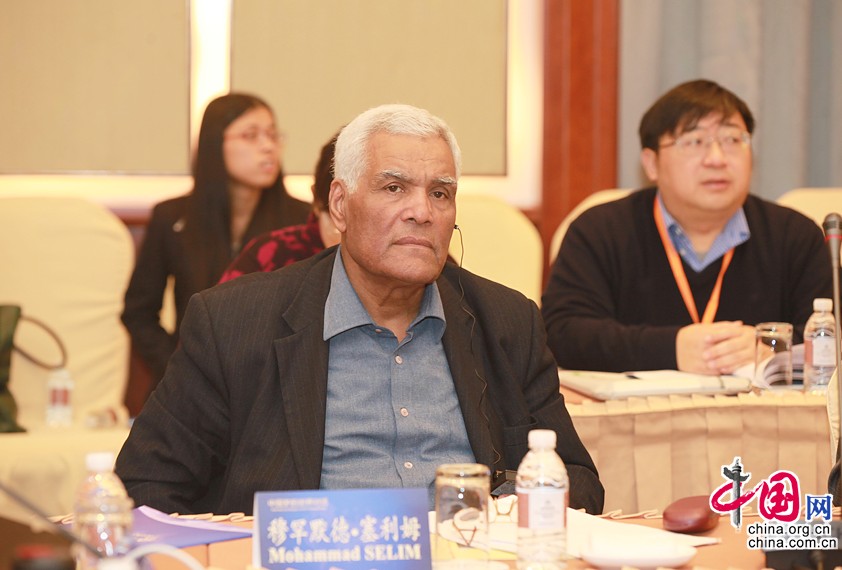Seminar on Chinese Dream: a dream shared by the world
 0 Comment(s)
0 Comment(s) Print
Print E-mail China.org.cn, December 8, 2013
E-mail China.org.cn, December 8, 2013
| Tan Zhong, Tenured professor of Jawaharlal Nehru University is at the Dialogue [China.org.cn] |
Chinese Civilization and the Spirit of Harmony:
The Chinese Dream and the World
Tan Zhong, Tenured Professor
Jawaharlal Nehru University
China was born a civilized country. During the two thousand years when it was a super power, China had never colonized or taken lands of other countries, but remained concentrated on its diverse yet unified internal affairs. It had been conquered several times in history but seldom invaded others; China has always emphasized peaceful means of running a country instead of through military strengths. In a word, the Chinese civilization has never been bellicose. Peace and harmony are what it cherishes most.
China hopes to share the Chinese Dream with the rest of the world. China welcomes peoples of other countries to China to enjoy the "dream culture". The Chinese Dream that is shared by China's 1.3 billion people includes "benefiting the whole world with an everlasting effect". China is looking to establish with the US a "new model of major-country relations" characterized by "no conflict or confrontation", "mutual respect" and "win-win cooperation"; China wishes to keep permanent peace and share in a common destiny with neighboring countries; China hopes to achieve common prosperity together with the rest of the world. China welcomes foreigners to take part in the Chinese Dream, as the Chinese people also dream the dreams of foreign countries. The Chinese Dream is one of uniting China and other countries to create a harmonious world. From this perspective, the Chinese Dream can be cherished by the whole world.
| Mohammad Selim, professor of politics, Kuwait University is at the Dialogue [China.org.cn] |
The Chinese Dream: An Arab Perspective
Mohammad Selim
Professor of Politics, Kuwait University
The concept of the Chinese Dream was coined in 2013 by the Communist Party (CPC) General Secretary Xi Jinping. He described the dream as "national rejuvenation, improvement of people's livelihoods, prosperity, construction of a better society and military strengthening. He stated that young people should "dare to dream, work assiduously to fulfill the dreams and contribute to the revitalization of the nation. It looks as if the Chinese vision is restricted to the domestic Chinese society. But in fact, the vision of a Chinese Dream has an external component which China has been advocating for the last decade, that is, a world of harmony of civilizations, and a win-win pattern of global relations which was reflected in the corollary concept of world new pattern of great power relations, which in fact, complements the notion of the Chinese Dream. The foreign policy component of the Chinese Dream has major implications regarding the Arab world and its future relations with China, especially as China is increasingly playing a role in Arab and Middle Eastern questions.
In the meantime, Arab peoples and intellectuals have been debating the question of an Arab Dream. In 2012, a group of young singers from different Arab countries, have presented an opera entitled "the Arab Dream, "in which they referred to issues more or less similar to those raised by the Chinese leader but with extra emphasis on questions related to pan-Arabism. The "Arab Spring" also represented for millions of Arabs a new vision of an Arab Dream. However, intervention of foreign powers resulted in steering the spring in directions that were not initially envisioned.


![Tan Zhong, Tenured professor of Jawaharlal Nehru University is at the Dialogue [China.org.cn] Tan Zhong, Tenured professor of Jawaharlal Nehru University is at the Dialogue [China.org.cn]](http://images.china.cn/attachement/jpg/site1007/20131213/8c89a590f56e1414f6c007.jpg)





Go to Forum >>0 Comment(s)